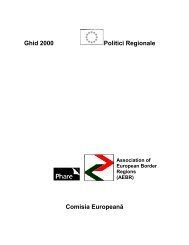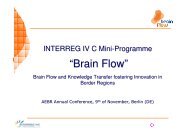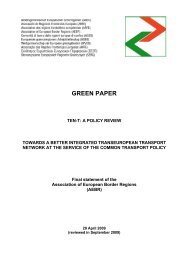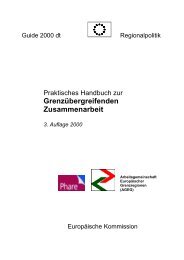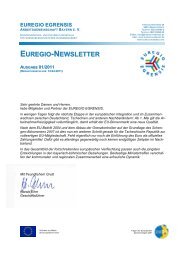Summary Barca-Report E 27-08-09 - Association of European ...
Summary Barca-Report E 27-08-09 - Association of European ...
Summary Barca-Report E 27-08-09 - Association of European ...
You also want an ePaper? Increase the reach of your titles
YUMPU automatically turns print PDFs into web optimized ePapers that Google loves.
Anlage (Nr. einsetzen) zum Protokoll der AGEG-Präsidiumssitzung am 5. Juni 20<strong>09</strong> in Burg (D)<br />
• It is not yet clear whether beside positive and negative effects also economic<br />
efficiency and geopolitical stability could be reached.<br />
• Up to now the transformation <strong>of</strong> territorial cooperation in tangible results is limited<br />
because <strong>of</strong> different factors:<br />
o Lack <strong>of</strong> coordination between EU and national policies as well as<br />
commitment <strong>of</strong> the states.<br />
o Possibilities <strong>of</strong> programmes are used inadequately. That can be found back<br />
in the fact that territorial cooperation hardly is mentioned in national<br />
mainstream programmes.<br />
o There is a lack <strong>of</strong> clarity in the political objectives. Most <strong>of</strong> the programmes<br />
are too large and to vague.<br />
o The territorial programmes are lacking <strong>of</strong> organisational commitment which<br />
is necessary to reach practical results.<br />
o Territorial cooperation is very complex. The projects are dominated by a<br />
multitude <strong>of</strong> different languages, cultural differences and the challenge to<br />
overcome sectoral barriers.<br />
o For the period 2007-20013 information is not yet available which could allow<br />
conclusions on the possible results.<br />
4c) Role <strong>of</strong> the regions<br />
• Since 1998 the influence <strong>of</strong> the regions on EU-programmes has considerably<br />
improved, for instance in elements like elaboration and implementation <strong>of</strong><br />
programmes as well as selection <strong>of</strong> projects (in Italy and the Great Britain) and<br />
through decentralised <strong>of</strong>fices (in Sweden and Finland).<br />
• New regional levels have been created in many states or the capacity <strong>of</strong> the<br />
regions has been strengthened (e.g. Finland, Ireland, Italy, Netherlands and<br />
Sweden).<br />
• In parts <strong>of</strong> South-, Central and Eastern Europe considerable deficits can be stated.<br />
• Since 2000 a re-centralisation can be stated from the regional to the national level<br />
(in the Netherlands and Sweden) or from the local to the regional level (in Flanders<br />
and Scotland).<br />
5<br />
AGEG/AEBR/ARFE / Enscheder Str. 362 / D-48599 Gronau / Tel.: 0049 2562 70219 / Fax: 0049 2562 70259<br />
info@aebr.eu / www.aebr.eu



